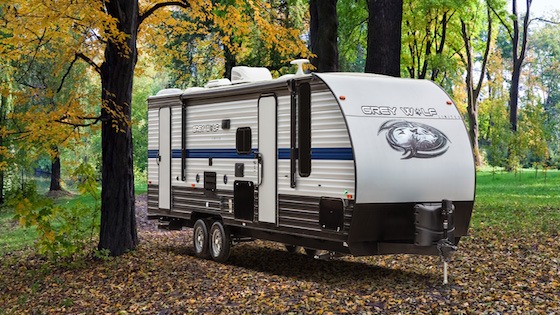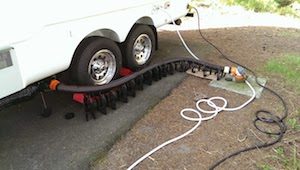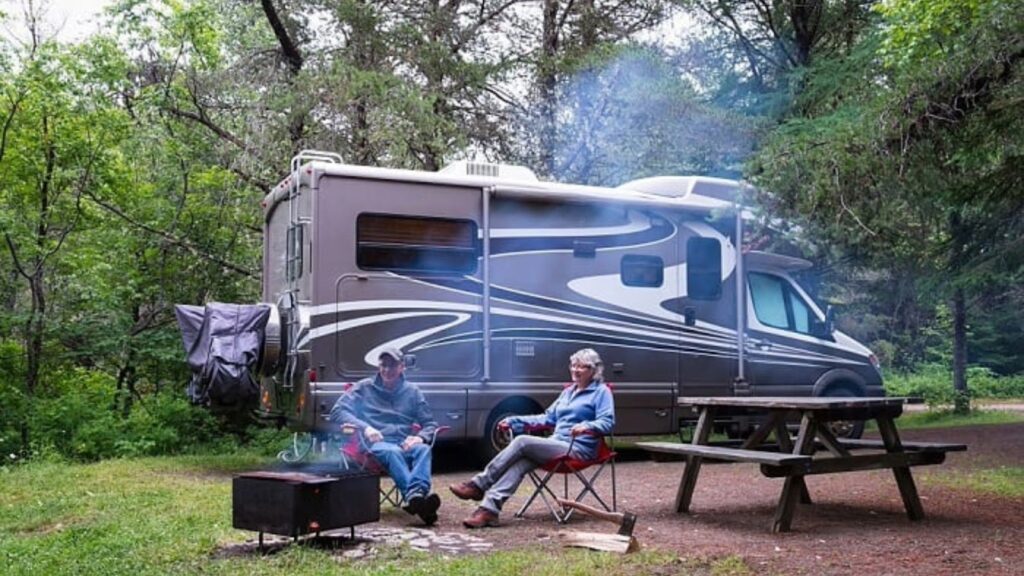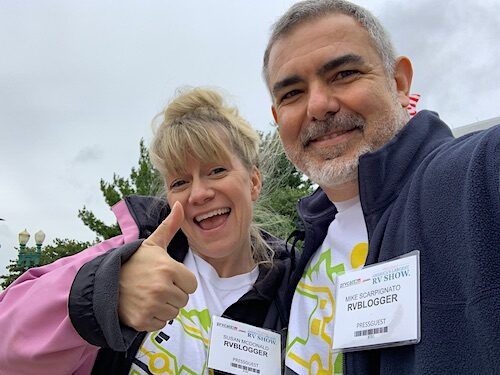


The answer: it really depends on your location, your property, local laws, and more.
I enjoyed legally having an RV parked on a piece of property that our family owned for years. It was an excellent place for fishing and hiking, and we thoroughly enjoyed it. And, it didn’t cost anything for our RV to be parked there year-round.
But what exactly are the zoning laws and logistics about living in an RV on your own property?
Sure, it’s your property and you ought to have the freedom to do what you want with it.
But is it legal to live in an RV on your property? There are many things to consider to ensure you can live in an RV on your property.
First, you must ensure your land is locally zoned for an RV. You also need to make sure you have access to the right utility hookups. It’s also essential to maintain positive relationships with your neighbors, the Homeowners Association, and everyone else who may be impacted by your RV.
But how do you achieve all of this? We’ll answer these questions and more for you below. That way, you can decide for yourself whether RV living on your property is right for you.

Some people choose a lifestyle that keeps them in contact with others; it feeds their need for socialization. Other people strategically elect a manner of living that puts them out of touch with others. They like the piece of quiet that accompanies a remote environment. Wherever you fall on the spectrum, there’s one thing that’s important to remember. Other people living in this world can’t always appreciate our way of life. That’s why, if you wish to maintain your recreational vehicle existence, it’s crucial to remain neighborly.
If you plan on living in an RV, it’s always best to let your next-door neighbors know ahead of time. This way you can discuss any of their concerns before you spend money to clear or level a spot only to find out you’re blocking your neighbor’s view. Any issues that arise regarding your RV living are best when dealt with firsthand.
It’s always best, in my opinion, to be friendly and talk to your neighbor about your plans ahead of time. If there’s one thing we’ve learned, what’s most important is going after the life we love to lead. For the RVer in you, this means keeping the neighbors pleased, too. In our book, whatever it takes to wake up in an RV every day is well worth the effort.
If you are looking to purchase land to live in your RV, there are quite a few things to consider first.
1. Zoning and Permitting Requirements – as we discussed start here and see if the land even allows RVs.
2. Power, Water, and Sewer—It can be very costly to add a well, septic field and electricity to your property. Instead of a septic field, you might be able to install a septic tank that will need to be pumped out periodically. And instead of electricity, you may be able to install solar power. But all of these options cost serious money.
3. Phone and Cable – You may or may not want phone and cable but if you do are they accessible? If not, can you at least get a cell signal?
4. Location, Location, Location – Is the land convenient to grocery stores, shopping, or work? Is it safe? Is it quiet? What other development could be in the planning stage in the area around the property? Every property has its pros and cons but it would be terrible to find the perfect property only to discover that a shopping center or shooting range will be built near the property where you want to live.
5. Clearing and Grading – how much will it cost to clear and level the land where you want to park your RV?
6. Access – Will you be required to (or have to) build an access road to your parking location? Some counties even require a permit to install a driveway apron which is the concrete that slopes up from the road to the beginning of your driveway.
7. Prepare for Changing Seasons – Not all RVs are 4-season friendly. And even the ones that are may need a little extra insulation in the cold months!
RV skirting can help keep your RV warm and pest-free in the winter. And if you know you’ll be living in an RV in very cold or hot temps, you can just get a four-season camper from the beginning to be better prepared.

Living in an RV on your own property has become popular among those seeking a simpler, more affordable lifestyle.
Living in an RV on your property can offer many benefits, whether you’re looking to downsize, save money on rent or mortgage expenses, or embrace a more minimalist lifestyle.
One of the main reasons people choose to live in an RV on their own property is the cost savings. You can save significantly on rent or mortgage payments by eliminating the need for a traditional house or apartment.
Living in an RV allows for flexibility and freedom that traditional housing cannot offer. Since the RV is personal property, you can move it anytime. Not having to sell or rent out a home makes moving or traveling to a different location easier. It also means if you change your living situation, you can easily do so without being tied down by a mortgage.
Maintaining an RV is much simpler compared to maintaining a traditional house. With less square footage and often fewer amenities, fewer things need upkeep, saving time and reducing maintenance costs.
Living in an RV usually means using less energy and resources than a traditional home. RVs are self-sufficient with solar panels, water tanks, and greywater systems. Living in an RV can reduce your carbon footprint and help you live more sustainably.
One of the most significant advantages of living in an RV is the freedom to travel whenever and wherever you want. You can easily pack up and move on to your next destination without worrying about booking flights or accommodation. When you have the freedom to explore new places at your own pace, it allows for spontaneous adventures.
Living in an RV also opens up opportunities for community building. There are many RV parks and communities where like-minded individuals gather, creating a sense of camaraderie and friendship. These communities often organize events, activities, and support systems for their members.
Compared to traditional housing options, RV living can be much more affordable. You save on rent or mortgage, as well as on utilities and maintenance costs. With proper budgeting and planning, living in an RV can be a cost-effective way to enjoy life on the road.
Living in a small space requires you to downsize and prioritize your possessions. Adopting a more minimalistic lifestyle can help you appreciate what truly matters and let go of excess clutter. It can also teach you valuable lessons about being resourceful and creative with limited space.
RV living is often associated with sustainability and eco-friendliness. Many RVers use solar panels for electricity, conserve water, and practice responsible waste disposal methods. Living off-grid can also help reduce one’s carbon footprint and leave a smaller impact on the environment.
Living in your RV on your own property can be a very inexpensive and practical lifestyle for you and your family. We hope this article can give you a starting point to help you make the best decision regarding living in an RV on your own property.
Do you have any advice about living in an RV on your own property? Please leave your comments below, or feel free to email us through our Contact Page.
Mike Scarpignato created RVBlogger.com over five years ago in 2018 to share all we have learned about RV camping.
Mike is an avid outdoorsman with decades of experience tent camping and traveling in his 2008 Gulf Stream Conquest Class C RV and 2021 Thor Challenger Class A motorhome.
We attend RV Shows and visit RV dealerships all across the country to tour and review drivable motorhomes and towable trailers to provide the best evaluations of these RVs in our blog articles and YouTube videos.
We are 3/4-time RVers who created RVBlogger.com to provide helpful information about all kinds of RVs and related products, gear, camping memberships, tips, hacks and advice.

Sharing is caring!
I was looking at starting a tiny home community of RV’s and tiny homes on wheels (campervans, skoolies, converted trucks) on some rural property my family owns in PA. It’s way off-grid and away from homes, stores, etc. I’m not having much luck finding out if it’s OK to do it in the area. I had a surveyor check it out and he says I could definitely put a well and septic tank there. I’ll be using solar for power. Do you think I should just go for it? Reply
Julia CaseyDear Sally, What Cindy said. If it’s safe, you have support, and both of you are comfortable; by all means, stay where you are. I took care of my parents (who both have dementia) for as long as I could, and it would have been much easier in a smaller space. I have a chronic pain condition and DREAM of living in a tiny home. Reply
Hi my daughter believes our RV is unsafe to live in. We are hooked up to all the amenities of a home and my husband has Cancer and prefers the RV.
She thinks not and he gets dementia
I own the RV not sure what to do ? Reply
Hi Sally,
That sounds like a tough situation. I’m no expert on dementia but my uncle has it too. He’s not safe to live alone at home or in an RV. Someone needs to be with him pretty much all the time. It’s sad to see someone go through this. I honestly don’t know what you should do. I know when I was dealing with this issue with my uncle I did what I thought was best for his overall quality of life and safety. My heart goes out to you and your family.
Mike Reply
Dearest Sally, my son and I lived in my 32’ RV during his battle with cancer. We were very comfortable! The upkeep was minimal allowing me the time to care for him. The key here is what you said; ‘your husband prefers it”! Folks with dementia don’t adapt to change! My son passed away last July at the age of 39, but I plan on living my remaining days in my RV home!! God bless and strengthen you ! Reply
Hello, I don’t actually live in the USA, but I still think this is a good article for everyone around the world. I have already seen many videos about living in an RV, many of them live or grid. If there is no electricity on your property, you might be able to install solar panels. I would also check this within the place of residence, because perhaps there are also rules for that. When there is no water present, is there perhaps another way or water available? Thank you for this great article. Reply
Mike ScarpignatoHi Astrid,
Thanks for reading the article. If there is no water available you could install a well on the property. Where I live the water table is about 200 feet deep so the cost of installing a well is expensive. Other than that I’m not sure what the best way to find water would be. This is why it’s good to have a well installed BEFORE you buy a piece of land. Or you should at least know that other properties around your land have active wells.
Thanks,
Mike Reply